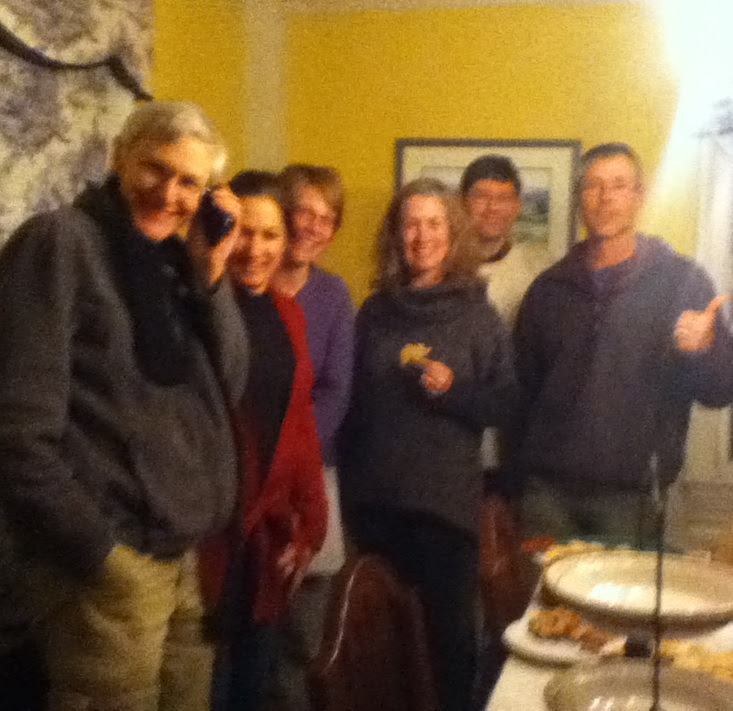December
13, 2012
New Year's Eve
at nourish
 Once again, our friends at nourish
restaurant will be holding a Family
New Year's Eve event and will donate some of the
proceeds to LexFarm!
Once again, our friends at nourish
restaurant will be holding a Family
New Year's Eve event and will donate some of the
proceeds to LexFarm!
nourish celebrates and supports all
things local - from fresh local food to fresh
local talent, and on New Year's Eve they'll be
featuring live performances from student groups
to entertain their dinner guests.
Do you know a student group
that would like to perform a
set?� Email nourishl...@hotmail.com
to book your time or call
Karen with
questions:
(508) 641-0878
Mom
and Kids Reunite at the Goat Yard
��
Visiting Hours:� Sundays, LexFarm Goat Yard,
1 - 3 pm
The
LexFarm
Goat Yard has been very busy over the past
month. We had a visitor,
Phippen, stay
with us for about a month, while
Naya and
Sapphire have been visiting her home barn
for breeding. Meanwhile,
Salt and
Pepper
are finally reunited with their mother,
Ionia,
after a very long weaning period. With leaves off
the trees, but no snow on the ground yet, they are
happy to find whatever

ground
forage they can when they are taken outside their
yard.
Interested in helping to walk the goats on a
regular basis?
Stop by during visiting hours,
Sundays from 1 - 3 pm (weather and
volunteers permitting!) and learn more!
If you are looking for a wonderful gift and a
great way of helping LexFarm, please consider our
Adopt-a-Goat
program!
Provide a unique gift and make a real
difference to LexFarm!
More Gift
Ideas for the Holidays
 You can help support local
fisheries with limited
edition ornaments in support of the Northwest
Atlantic Marine Alliance
(NAMA).� NAMA works to extend the conversation
around land-based food sustainability and
justice to the seas. Ornaments are $10 or
$15 depending on style, and can be
purchased at nourish
restaurant.
You can help support local
fisheries with limited
edition ornaments in support of the Northwest
Atlantic Marine Alliance
(NAMA).� NAMA works to extend the conversation
around land-based food sustainability and
justice to the seas. Ornaments are $10 or
$15 depending on style, and can be
purchased at nourish
restaurant.
 Or maybe
you would like to support tree planting in
Lexington and all the associated
benefits to the climate, such as carbon
sequestration, temperature reduction, rain
run-off, and reduction.� The Lexington Tree
Committee is offering
special medallions to celebrate Lexington's
300th anniversary.� Medallions are $15 and
can be purchased at the Lexington Department
of Public Works front desk, 201 Bedford
Street, or at the Visitors� Center, 1875
Massachusetts Avenue.
Or maybe
you would like to support tree planting in
Lexington and all the associated
benefits to the climate, such as carbon
sequestration, temperature reduction, rain
run-off, and reduction.� The Lexington Tree
Committee is offering
special medallions to celebrate Lexington's
300th anniversary.� Medallions are $15 and
can be purchased at the Lexington Department
of Public Works front desk, 201 Bedford
Street, or at the Visitors� Center, 1875
Massachusetts Avenue.
Membership Corner
Re-Cap of the Membership Drive

We want to
thank LexFarm Founding Members
Ricky Carter,
Nancy Gold,
Carolyn Goldstein, Tina
Jaillet and
Lynda Urgotis for
joining LexFarm board members last week at our
December Membership Calling party. It was lots of
fun, and many people responded generously by
either renewing their membership, or becoming a
LexFarm member for the first time.� If your
membership has lapsed or you are not yet a LexFarm
member, we hope you'll consider renewing or
joining in 2013: Individual Membership is only $20
a year and helps support our Goat Yard, this
newsletter and all of our work to bring a
community farm to Lexington.
Help Wanted
We need computer-skilled help!!
LexFarm is an all-volunteer organization with no
paid staff. As we continue to work on establishing
educational programs and planning for a community
farm, we are looking for volunteers who can help
in any of the following areas: Membership
coordination, newsletter updates, website updates,
publicity/event management and goat yard
scheduling/coordination. Especially if you know
your way around google docs and spreadsheets,
Wordpress
websites and/or social media,we would love to hear
from you!� Contact
Janet Kern.
Show
Your Support, Become a Member
A donation of $20.00 for an
individual membership or $35.00 for
a family membership will help us meet
our current expenses and plan for the future.�
You can sign up online here or send a check payable to Lexington
Community Farm Coalition at P.O. Box
554, Lexington, MA 02420. If you have
any questions, contact Brenda Netreba at membe...@lexfarm.org.
Wild
Edible Plant Series
This
series covers wild
edible plants
found in New
England as told in
Russ Cohen's book,
"Wild Plants I
Have Known... and
Eaten."� If you
haven't had the
chance, take some
time to read this
delightfully
informative book
to find out more
on wild plants for
sustainable
eating.
Note:� If you are unfamiliar
with harvesting wild edibles,
please consult a plant expert
before attempting to forage on
your own.
 Part Five:
Part Five: The burdock
plant (
arctium spp.) is a
biennial species (having only a two-year life
cycle) with long and slender roots that can be
harvested between the first half of the plant's
first growing season, to the beginning of its
second year.� They are easily recognized by
their burrs (not edible), which always seem to
find there way on your clothes after summertime,
and are also known as the inspiration for velcro
(TM).� In Essex county, burdock is often found
in fields, forest edges and even vacant lots.�
Burdock root, a popular Asian staple commonly
found in the macrobiotic diet, is highly
regarded as a low-calorie food source and for
its wealth in dietary fiber and potassium.� When
eaten raw, burdock root can have a mildly sweet
and crisp flavor, however, because it possesses
tannin-forming compounds that cause browning and
an off-putting flavor, it is best to shred and
soak the raw roots in water for a few minutes
before eating.� Burdock flower stalks are also
edible, which can be harvested during its second
growing year, when it has reached about 1 to 2
feet in height before its flowers develop.� When
preparing burdock stalks, the outer rind should
be removed for its bitter taste. When boiled,
the peeled stalks resemble the taste of
artichokes.� Burdock "petioles" (leaf stalks)
are also edible and best eaten when boiled until
tender as well.� Known as a native wild edible,
it has been a long-time friend and food source
to New Englanders for centuries.
Note to Readers: Our
previous entry in the Wild Edibles series
was about the plant Autumn Olive. One of our
readers noted that Autumn Olive is an
invasive species, a fact which we mentioned
but did not highlight. Just to be clear: we
recommend gathering and eating as many
invasive plants as possible, while taking
care not to cause them to spread in the
process!
Further Thinking
With increasing demands for organic milk, small
dairy farmers are switching to organic
practices, yet despite the environmental and
health benefits that make organic dairy the
obvious choice, federal policies are making it
difficult for them, giving non-organic dairy
farmers the competitive advantage.� Read more it
about it here.
We
welcome your feedback
Please
write us at newsl...@lexfarm.org
with all feedback regarding the Update or if
you have suggestions for area events that we
can announce.
Jeanne Lin and Allison Moody